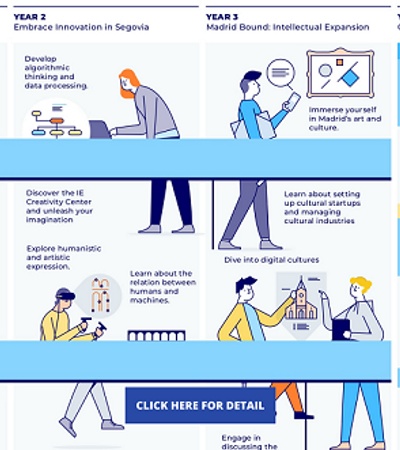- Home
- Studies
- Undergraduate Degrees
- Bachelor In Humanities
A UNIQUE BACHELOR IN HUMANITIES
The study plan for the Bachelor in Humanities at IE University has been designed with academic expertise and professional experience at its core.
Not only will you benefit from our faculty's expert knowledge, but also from the strong links IE University has cultivated with the professional world. We strive for balance and expansion.
The curriculum is designed in such a way that you're always developing critical thinking and practical skills that allow you to confidently venture into new, unexplored directions.

WANT TO KNOW MORE?
BACHELOR IN HUMANITIES STUDY PLAN
COURSE DESCRIPTIONS
Discover more details about all courses.
LEARN MORE ABOUT OUR BACHELOR IN HUMANITIES
FIRST YEAR - FOUNDATIONS I (SEGOVIA)
During the first year, you will start acquiring solid foundations in the humanities. This includes exploring the principles of humanistic inquiry, learning to formulate and answer critical questions that speak to various facets of human existence; and synthesizing the complex movements of global history. You will also be introduced to some of the essential technical skills such as programming and digital humanities—practical skills that allow you to translate knowledge into action in our fluid world.
SECOND YEAR: FOUNDATIONS II (SEGOVIA)
In year two, you'll continue to master foundational knowledge and acquire essential skills across diverse fields. Segovia's rich history makes it the perfect space to explore courses in the areas of art history, archaeology and literature, to name a few. You’ll develop innovative digital skills through the study of digital imaging and explore the professional component of culture through the Creativity Lab.
THIRD YEAR: PROFICIENCY (Madrid)
Year three is a major step in your intellectual journey as you'll build upon the foundations established during the first two years in advanced courses. You'll explore the intersection of philosophy and history, further your practical experience in programming with a course based on natural language processing (NLP), and dive into marketing fundamentals. The city of Madrid and its renowned arts and culture institutions will serve as your classroom.
FOURTH YEAR - SPECIALIZATION (ABROAD & MADRID)
During the final year, you will have a great degree of flexibility in designing your curriculum. The ability to choose the electives that interest you most allows you to develop bespoke specializations which might not be available elsewhere. As an international institution, IE University also encourages students to make the most of the exchange opportunities on offer in order to experience different cultures and learn from the best in their fields at other universities. You’ll conclude your experience with a self-designed capstone project that will represent not only the culmination of your IE University experience, but also serve as a major stepping stone into the professional world.
The Bachelor in Humanities learning journey
Your path to career success unveiled through our engaging infographic: Explore it to discover more about the program structure!
Bachelor in Humanities Tracks
Advanced Digital Methods and Tools
The Advanced Digital Methods and Tools track positions you for highly demanding roles in the job market through a competitive knowledge of processing data—including big data—and creating and designing humanities-based content for digital media.
is for individuals who are…
eager to discover how we can shape the future through technology through the critical approach offered by the humanities.
looking for…
digital training and the development of an analytical mindset to drive change.
to become...
• a natural language processing (NLP) professional working for a tech company
• a technology ethics consultant
• a UX researcher
• a digital marketing and communications specialist
Arts and Cultural Management
Studying the humanities opens your eyes to the world around you. The Arts and Cultural Management track provides you with a deep dive into cultural analysis, fundraising and project management. You'll build the knowledge and skills to establish a successful career in the arts and culture sphere while gaining a holistic economic view of the sector.
is for individuals who are…
deeply committed to the arts and humanities, who are willing to develop themselves professionally in this economic sector by gaining expertise in its content, along with the managerial skills needed to secure a role within the industry or create their own entrepreneurial venture.
looking for…
the rigorous academic content that provides expertise in the arts and humanities, along with the cutting-edge managerial and digital tools to drive success in this sector.
to become...
• a cultural institution manager
• a professional in heritage tourism
• a publishing and media professional
• a fundraiser for arts organizations
• a cultural entrepreneur
COLLABORATION WITH UNESCO
The collaboration between IE University and UNESCO strives to establish a unique and enriching learning environment for students, where they can benefit from UNESCO's vast knowledge and expertise. This collaboration is built upon several areas of common interest, such as the ethics of artificial intelligence or social transformations driven by technology and innovation, and recognizes the pivotal role of the humanities in addressing pressing global challenges.
Thus, IE University and UNESCO will work together on a range of academic initiatives to foster interactive learning experiences. This collaborative effort encourages students to apply their knowledge and skills in real-world contexts through informative sessions, talks, workshops, applied projects or mentorship. The collaboration between IE University and UNESCO also extends to the design and organization of extracurricular and career-development activities, including internships, events, competitions, simulations and academic trips.
To enhance these initiatives, both institutions will strive to mobilize applied research, impact projects and other activities, alongside additional student resources related to the Bachelor in Humanities.

immersive and transformative educational experience
In essence, the collaboration between IE and UNESCO* aspires to create an immersive and transformative educational experience, where students not only acquire specialized knowledge but also develop a broader perspective to understand the intricate interplay between human values, scientific advancements, and societal impacts.
Learning a new language can open up a world of new opportunities
IE University considers multiple language acquisition to be a key element of its educational model, leading to success in both work and study.
The Language Center at IEU is proud to offer students the possibility to study a wide range of languages, including French, German, Portuguese, Chinese, Arabic, Spanish, and English. With such a large variety of options, our students are able to personalize their academic path to meet their future career plans and objectives.

The Language Center at IEU
The Language Center helps students develop their multilingual communicative skills to help them flourish in the international labor market.
THE DUAL DEGREES OF IE UNIVERSITY
Develop a multidisciplinary profile and specialize in two distinct, yet connected fields, by combining another bachelor degree with your studies in Business Administration.
THE DUAL DEGREE IN BUSINESS ADMINISTRATION AND HUMANITIES
The Dual Degree in Business Administration and Humanities offers a unique and comprehensive educational experience that merges the analytical and critical thinking skills from the Bachelor in Humanities program with the practical business acumen from the Bachelor in Business Administration program.
Undergraduate Degrees | English | five years
APPLICABLE REGULATIONS OF THE PROGRAM
FREQUENTLY ASKED QUESTIONS
What are the characteristics of humanities?
The Bachelor in Humanities is built upon a profound understanding of human heritage. Delve into transcultural exchanges that have shaped global history, explore influential ideas that have deeply influenced our social organization and examine movements that have transformed the art world. Still, the bachelor’s degree also fearlessly looks ahead.
How useful is a humanities degree?
It equips students with critical thinking, analytical, and communication skills that are highly sought after in a wide range of professions. Studying humanities encourages creativity, empathy, and an appreciation for different perspectives, which are crucial in fields like marketing, advertising, and the arts.
What subjects do humanities study?
At IE University you will explore the principles of humanistic, technical skills of digital humanities, explore the diversity of ideas that humans have developed to make sense of our complex and paradoxical natures. IE University also encourages students to go on exchange, an opportunity to experience different cultures and to learn from the best in their fields at other universities.
How long is a Bachelor in Humanities?
The duration of a Bachelor in Humanities can vary depending on the educational institution and country. Typically, it is a four-year undergraduate program. However, there may be variations in the program length, such as three years or extended programs that include internships or co-op experiences. It is advisable to check with the specific university or college offering the program for accurate information on program duration.
How hard is an humanities degree?
Like any academic pursuit, it requires dedication, hard work, and a commitment to learning. While humanities degrees may not involve as many technical or quantitative skills as some other fields, they often demand rigorous reading, critical analysis, and extensive writing. This can be challenging for some students, especially those who may struggle with research, writing, or grappling with complex theoretical concepts.







